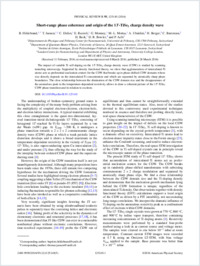Short-range phase coherence and origin of the $1T-{\mathrm{TiSe}}_{2}$ charge density wave
- Hildebrand, Baptiste Département de Physique and Fribourg Center for Nanomaterials, Université de Fribourg, Switzerland
- Jaouen, Thomas Département de Physique and Fribourg Center for Nanomaterials, Université de Fribourg, Switzerland
- Didiot, Clément Département de Physique and Fribourg Center for Nanomaterials, Université de Fribourg, Switzerland
- Razzoli, Elia Département de Physique and Fribourg Center for Nanomaterials, Université de Fribourg, Switzerland
- Monney, Gaël Département de Physique and Fribourg Center for Nanomaterials, Université de Fribourg, Switzerland
- Mottas, Marie-Laure Département de Physique and Fribourg Center for Nanomaterials, Université de Fribourg, Switzerland
- Ubaldini, A. Department of Quantum Matter Physics, University of Geneva, Switzerland
- Berger, Helmuth Institut de Génie Atomique, Ecole Polytechnique Fédérale de Lausanne, Switzerland
- Barreteau, C. Department of Quantum Matter Physics, University of Geneva, Switzerland
- Beck, Hans Département de Physique and Fribourg Center for Nanomaterials, Université de Fribourg, Switzerland
- Bowler, D. R. London Centre for Nanotechnology and Department of Physics and Astronomy, University College London, United Kingdom
- Aebi, Philipp Département de Physique and Fribourg Center for Nanomaterials, Université de Fribourg, Switzerland
-
28.03.2016
Published in:
- Physical Review B. - 2016, vol. 93, no. 12, p. 125140
English
The impact of variable Ti self-doping on the 1T−TiSe2 charge density wave (CDW) is studied by scanning tunneling microscopy. Supported by density functional theory, we show that agglomeration of intercalated-Ti atoms acts as preferential nucleation centers for the CDW that breaks up in phase-shifted CDW domains whose size directly depends on the intercalated-Ti concentration and which are separated by atomically sharp phase boundaries. The close relationship between the diminution of the CDW domain size and the disappearance of the anomalous peak in the temperature-dependent resistivity allows to draw a coherent picture of the 1T−TiSe2 CDW phase transition and its relation to excitons.
- Faculty
- Faculté des sciences et de médecine
- Department
- Département de Physique
- Language
-
- English
- Classification
- Physics
- License
- License undefined
- Identifiers
-
- RERO DOC 260589
- DOI 10.1103/PhysRevB.93.125140
- Persistent URL
- https://folia.unifr.ch/unifr/documents/304877
Statistics
Document views: 69
File downloads:
- aeb_srp.pdf: 123
